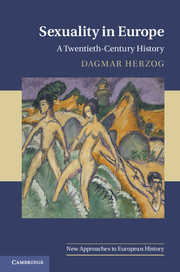5 - Partnerships and practices 1980???2010
Published online by Cambridge University Press: 05 June 2012
Summary
The unexpected and devastating emergence of HIV/AIDS in the early 1980s was to have considerable consequences for how the sexual revolutions of the prior decades would be remembered. The initial media responses to the disease were largely horrific. The ultimate result, however, was more complex. Eventually, the collective public and governmental response brought many positive changes as Europeans developed greater comfort both with negotiating sexual practices and with appreciating human sexual diversity. The trend toward broad commitment to individual sexual rights would be even further consolidated by developments in the wake of the fall of communism as well as Europeans’ efforts to grapple with the challenges wrought by the rise of Islam – a striking and important counterpoint to the more disturbing reactions to Islam evident in the ascent of far-right, explicitly anti-immigrant and anti-Muslim political parties. Most notably, the consensus in favor of the value of individual sexual self-determination came to incorporate also the traditionally conservative parties. The pressure to promote tolerance became strong. The results were evident in both law and culture.
- Type
- Chapter
- Information
- Sexuality in EuropeA Twentieth-Century History, pp. 176 - 217Publisher: Cambridge University PressPrint publication year: 2011

